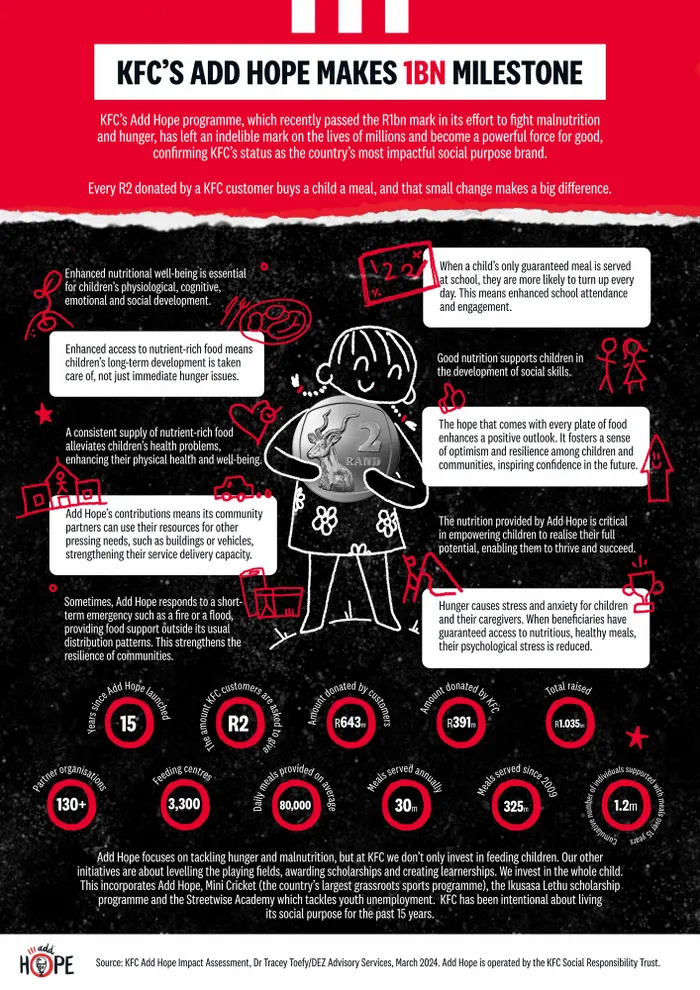SS KFC’s R1bn milestone moment for Add Hope 2906

Fuelled by customers’ R2 donations, the collaborative initiative has ‘truly become the symbol of small change making big change. Image: Supplied.
KFC’s Add Hope programme, which recently passed the R1bn mark in its effort to fight malnutrition and hunger, has left an indelible mark on the lives of millions and become a powerful force for good. That’s the conclusion of an impact study, conducted in partnership with senior GIBS lecturer, Dr Tracey Toefey and DEZ Advisory Services, commissioned by KFC to mark the programme’s 15th anniversary.
Add Hope encourages customers to voluntarily add a R2 donation to their bill, which KFC then supplements. The study found that customers contributed almost R644 million. With R391 million from KFC, more than R1 billion has been spent feeding malnourished children. Together this provides more than 80,000 meals on average daily.
Akhona Qengqe, General Manager of KFC Africa, said the R2 donations grew by 45% in 2023, confirming the power of collective effort and the potential of the impact we can make.
“In 2023, we raised R64 million in R2s and served more than 32 million meals. That’s a whole lot of hope added,” she said. “When you hear about the scale of the hunger that exists in South Africa, it can seem insurmountable. The solution can seem far away. But we can all make a meaningful contribution towards that solution by donating something as seemingly small as R2.”
Toefy said: “Add Hope is one of the largest corporate and social initiatives in the country and … has truly become the symbol of small change making big change”.
The study adopted a research approach to assess the impact of the nutrition Add Hope funds. It reported numerous positive outcomes, ranging from improved physical health, school attendance and social skills to reduced psychological stress.
It also pointed to Add Hope’s importance for long-term social, economic and personal progress, and case studies illustrated the programme’s impact on individuals, partner organisations and the communities they serve.
“The ripple effects of Add Hope reverberate throughout society,” said the report. “It exemplifies the transformative power of corporate social responsibility,” Toefy said.
StatsSA’s 2023 General Household Survey, published a month ago, found that almost one in four households (23.1%) consider their access to food inadequate or severely inadequate, five percentage points higher than in 2019 before the outbreak of Covid-19, and the Add Hope study said this added up to a disaster for children.
“The damaging and far-reaching effects of food insecurity and poor nutrition are cognitive, physical, social and psychological in nature. Children without adequate quality nutrition cannot achieve their developmental and academic potential, and are at higher risk of experiencing lifelong health and economic challenges. Conversely, optimal nutrition is positively associated with strong child development,” Toefy added.
Qengqe said South Africa was on a long journey to address inequality, “and hunger is the gatekeeper. Overcoming inequality starts with something as simple as a nutritious meal.”
Add Hope partners with more than 130 non-governmental organisations, non-profit organisations and community feeding schemes which identify children who are most at risk of hunger and malnutrition. The nutritional value of each plate of food served at more than 3,300 feeding centres is carefully considered, with meals designed to be cost-effective, nourishing, culturally relevant and age-appropriate.
Speaking to Add Hope partners, Toefy and her colleagues collected numerous testimonials about the programme’s impact. One partner said a beneficiary was “healthier than she’s ever been”. Another spoke about a boy “who has changed from a severe case of kwashiorkor [malnutrition produced by a severe protein shortage] to a healthy and normal child”.
In some cases, Add Hope has saved lives, said Mandy Spies of SOS Children’s Villages. “We’ve had a number of children who have been in dire situations, who have almost died because of neglect, not having food.”
Onyi Nwaneri, of Afrika Tikkun, said Add Hope had professionalised her organisation’s approach to nutrition. “Before KFC, we fed like everybody else. With KFC, we feed with intention, with insight into the science behind nutrition and what it achieves with different ages of children.”
Sue Wildish of The Lunchbox Fund told a heartwarming story about witnessing a child’s transformation. “The eczema had gone. He was running around playing with other children. He had literally attended school every single day since we had last been there. He was singing with other kids, counting”.
Qengqe said Add Hope was one of several KFC initiatives investing in children and young people. Mini Cricket, the country’s largest grassroots sports programme, gives 120 000 girls and boys between the ages of three and 12 the opportunity to be active.
“Our Ikusasa Lethu scholarships provide access to quality education for children who are Add Hope beneficiaries or whose parents work for KFC, and our Streetwise Academy tackles youth unemployment. Many young people don’t have matric, so the academy – which is National Qualifications Framework-accredited – supports them in getting their matric and diplomas.”
Qengqe added that KFC relied on the communities where it operated. “That’s why we need to make a meaningful difference in people’s lives. The Add Hope impact report shows that we are doing just that, and we’re delighted to have this evidence of how support from the people of South Africa is not only making a vital difference but saving lives.”
Related Topics: